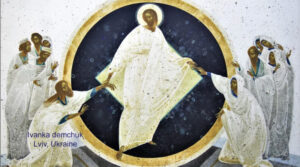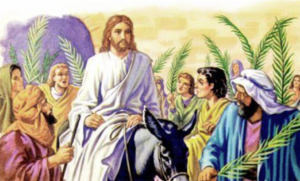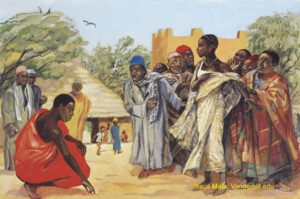“Jesus said to the Jewish crowds:
‘I am the living bread that came down from heaven;
whoever eats this bread will live forever;
and the bread that I will give
is my flesh for the life of the world. . .
Just as the living Father sent me
and I have life because of the Father,
so also the one who feeds on me
will have life because of me.'” John 6:51,57
Many years ago, while studying for a Masters degree in Mathematics at the Catholic University of America, Washington, DC, I experienced something that transformed the way I read something that is important to me. Up until that time, I, perhaps like many of you, tended to read things so quickly that I didn’t give myself time to drink in the deepest, most satisfying and illuminating reality of the author’s words, the true meaning of which had the capability of lifting me out of the ordinariness of the world of physicality, in which I lock myself when I am relying only on what my senses and my past experiences reveal to me.
As so frequently is expressed by one of us gathered for our parish’s Tuesday Bible Studies, humanity has not changed since the days of Adam and Eve. How little progress we humans have made in using our God-given free wills to discover and fall in love with this Creator and Father, whose plan has always been to assimilate us into Himself/Herself. (There is no male or female in God. We are each incomplete manifestations of the God in whose “image and likeness” we have been made.) I often ponder why we humans haven’t made much headway in “seeing” God and letting the reality of God consume us, and I now am led to believe that the problem is our overconfidence in what our senses and our own experiences tell us. So, maybe that is why God became Man in the person of Jesus, and perhaps that is why Jesus left us the Eucharist.1
TRYING TO SEE WHAT GOD “HAS IN MIND”
Oh, sure, we should be able to look at a tree – with all its simplicity and the complexity of its design and functioning – and see the deeper reality of God, its Creator, and the deepest meaning and purpose behind God’s creating trees. But we don’t. We see a tree – just one tree like many other trees. We need to give ourselves the thrill of seeing trees and other objects around us from the deeper, God-intended perspective.
And the Eucharist, that which comes to be when Jesus, God-in-flesh, says (not “said” but “says” through the person of the ordained priest) “This is my Body.” “This is my Blood,” can God say this and it really happens? Would God say this? What do you think? Yes or No? Why would God do this?2
COVID SEPARATION FROM THE EUCHARIST
There are many times when we are forced to be separated from the physical presence of those we love, but even that lack of physical contact doesn’t sever our connection with them. So it is with us now, when most of us are unable to receive Holy Communion. Let us be satisfied for now with Spiritual Communion, patiently awaiting the day when we can participate fully in this wondrous Gift.
GRATITUDE FOR THE WITNESS OF OUR PRIESTS
Even though I am unable to authenticate the author(s), I offer these two statements that sum up what I deeply see in the efforts of our parish priests, Msgr. Tim and Fathers Tom and Sebastian during these days of physical separation from our church and communal worship:
“When you no longer burn with love, others will die of the cold.” attributed to St. Vincent de Paul3
and
this attributed to François Mauriac: “If you are friends with Christ many others will warm themselves at your fire. […] On the day when you no longer burn with love, many will die of the cold.”4
On behalf of the parishioners of St. Michael’s, I thank our priests whose “friendship with Christ” has been so very evident to us during these days and weeks of social distancing. Thank you, Frs. Tim, Tom and Sebastian for allowing us to experience the love of Christ that burns in your hearts.
Sister Loretta
- Please read or re-read First Holy Communions, Weddings, Mothers Day and Fathers Day
- Ibid.
- “Father Mac (Monsignor Ignatius McDermott) died at 95 of natural causes on December 31, 2004, having continued his involvement with Haymarket Center until his death. With seven decades of service in the priesthood, Father Mac’s favorite saying from St. Vincent De Paul continues to inspire us all: “When you no longer burn with love, others will die of the cold.”, ‘The Priesthood of Monsignor Ignatius McDermott”, Intervention Instruction.
- Gospel Reflection, Easter Sunday, 2016, St. Anthony of Padua Church, Brampton, Ontario, Canada.




